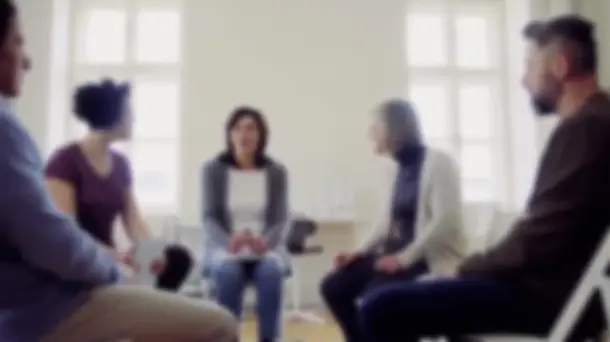Welcome to Narcotics Anonymous
What is our message? The message is that an addict, any addict, can stop using drugs, lose the desire to use, and find a new way to live. Our message is hope and the promise is freedom.

“When new members come to meetings, our sole interest is in their desire for freedom from active addiction and how we can be of help.”
It Works: How and Why, “Third Tradition”
Is NA for me?
This is a question every potential member must answer for themselves. Here are some recommended resources that may be helpful:
Need help for family or a friend?
NA meetings are run by and for addicts. If you're looking for help for a loved one, you can contact Narcotics Anonymous near you.
Subscribe to NAWS Emails
Sign up to receive Just for Today and SPAD daily meditation emails, as well as NAWS News, NAWS Updates, and more.
Never before have so many clean addicts, of their own choice and in free society, been able to meet where they please, to maintain their recovery in complete creative freedom.
Basic Text, “We Do Recover”
Recovery Quicklinks:
Service Quicklinks:
Narcotics Anonymous sprang from the Alcoholics Anonymous Program of the late 1940s, with meetings first emerging in the Los Angeles area of California, USA, in the early Fifties. The NA program started as a small US movement that has grown into one of the world's oldest and largest organizations of its type.
Today, Narcotics Anonymous is well established throughout much of the Americas, Western Europe, Australia, and New Zealand. Newly formed groups and NA communities are now scattered throughout the Indian subcontinent, Africa, East Asia, the Middle East, and Eastern Europe. Narcotics Anonymous books and information pamphlets are currently available in 49 languages.
Information About NA
Daily Meditations
Just for Today
June 09, 2025 |
Old dreams needn't die |
| Page 167 |
| “Lost dreams awaken and new possibilities arise.“ |
| Basic Text, p. 91 |
| Most of us had dreams when we were young. Whether we dreamed of a dynamic career, a large and loving family, or travels abroad, our dreams died when our addiction took hold. Anything we ever wanted for ourselves was cast away in our pursuit of drugs. Our dreams didn't go beyond the next drug and the euphoria we hoped it would bring. Now in recovery, we find a reason to hope that our lost dreams could still come true. No matter how old we are, how much our addiction has taken from us, or how unlikely it may seem, our freedom from active addiction gives us the freedom to pursue our ambitions. We may discover that we're very talented at something, or find a hobby we love, or learn that continuing our education can bring remarkable rewards. We used to put most of our energy into spinning excuses and rationalizations for our failures. Today, we go forward and make use of the many opportunities life presents to us. We may be amazed at what we're capable of. With our foundation of recovery, success, fulfillment, and satisfaction are within our reach at last. |
| Just for Today: Starting today, I'll do whatever I can to realize my dreams. |
A Spiritual Principle a Day
June 09, 2025 |
Communication Is a Two-Way Street |
| Page 166 |
| “We learn to listen carefully, and to communicate in a way that we can be heard.“ |
| Living Clean, Chapter 5, “Being a Parent” |
| Addiction does a number on our ability to communicate. We can get so preoccupied with self-obsession that it's hard to pay attention to others–unless, of course, there's something in it for us. For many of us, the ability to hear the message for the first time–to truly experience the hope that our message offers–was a result of desperation. A member wrote, “The people who had what I wanted shared with honesty and vulnerability. They taught me how to save my life.” We needed something different very badly, and the message of hope got through. We were home. And then comes early recovery. Minds racing. Our bodies difficult to keep still. “When I was new, I couldn't hear what anyone was saying,” one member wrote. “The noise in my head was just way too loud. I kept coming back, and things started to get through. The slogans began to make sense. The fog in my head cleared away and I shared honestly. Others responded, and I felt connected.” Clearing out the noise in our heads helps us communicate better in all of our relationships. We learn by attending meetings, by connecting with our sponsor, by helping sponsees, and those lessons in communication improve our ability to communicate in other areas of our lives. Our growth improves our relationships with our partners, our parents, our friends, our children. Sometimes, we simply shut up and listen. One parent in recovery shared, “I couldn't get my child to listen to me, and my sponsor reminded me it's a two-way street. I should try listening to my child more.” When we give our attention to others, we understand them better. If words fail us, we speak through our actions. |
| ——— ——— ——— ——— ——— |
| Recovery thrives on vibrant, two-way communication. I will listen with an open heart and share in that same spirit. |
Do you need help with a drug problem?
“If you’re new to NA or planning to go to a Narcotics Anonymous meeting for the first time, it might be nice to know a little bit about what happens in our meetings. The information here is meant to give you an understanding of what we do when we come together to share recovery…”
Subscribe to NAWS Emails
Sign up to receive NAWS Updates and NAWS News emails as well as Just for Today and SPAD daily emails.




